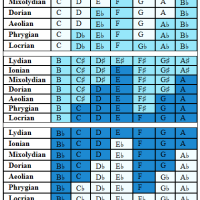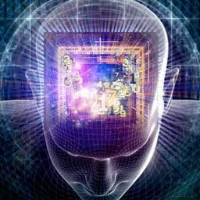 One of the more interesting sermons I heard during my last bout of churchgoing involved the notion that prayer wasn’t necessary because God knows what’s really in our hearts. Per the dogma of Christianity, that’s actually a true point. (Albeit perhaps a surprising one for a pastor to preach.)
One of the more interesting sermons I heard during my last bout of churchgoing involved the notion that prayer wasn’t necessary because God knows what’s really in our hearts. Per the dogma of Christianity, that’s actually a true point. (Albeit perhaps a surprising one for a pastor to preach.)
It points out a key distinction between theism and deism. In the former, most religions, God is personally involved with us and hears our prayers (God’s responses have always been a different matter.) In the latter, God is not personally involved and doesn’t.
On the other hand, some see prayer as merely a form of meditation.
Following my former pastor’s line of reasoning, prayer is indeed just an exercise of faith — a meditation, albeit one with observance. One might consider the content of prayer less important than the reflection of our faith in its practice, but I think what we pray for matters, too.
Some pray for personal gain, wealth, success, or power, but that is contrary to the basic Christian notion of selflessness (a notion generally shared by other religions and spiritualities — as if there really was something to the idea that wealth and spirit are incompatible). Praying for God to give you material gain seems empty to me, largely a prayer for luck.
Consider two devout sports teams, each in their respective locker rooms, devoutly and fervently praying for a win. Obviously, both prayers can’t come true. What exactly is the prayer for? To be given a win? Or the luck? Maybe the strength or wisdom to win? How about a biased referee or broken legs for the other team? Is that over the top? In such a contest, what should one pray for?
To me, personal gain seems ruled out as not Christian in spirit. (I can’t help but express my sadness at how many wear that label but don’t respect the designer’s express wishes as rather clearly laid out in the user’s guide.)
So, if not for personal gain, what can one pray for?
I used to pray for the strength. Sometimes just the strength to get through small tasks (making and keeping that doctor appointment). Sometimes the strength to be a better person or the wisdom to even know what that is.
Even that eventually struck me as asking God to give me something. If I can do those things, and I generally can when I man up, then God made me with the necessary strength all along. I don’t ask for what I don’t have, I ask for help finding what I do have. That seems legit. Even as a form of meditation.
Another form of prayer I’ve settled on is praying for the health and happiness of loved ones (be they humans or dogs — the rest of the animal kingdom is on its own). I’d pray for the world to reach a better place, but one step at a time. These may be no more than one’s hopes for the futures of people we care about, but at the least it gets us thinking about those people (or dogs) most important in our lives.
Finally, there are prayers of thankfulness for the many blessings and good things in my life. I’m painfully aware that most of the world is worse off — I’ve been extremely fortunate in terms of birth and life — and I try to remember to give thanks, even for the little things (like a safe journey). Again, this is a mostly a matter of reflecting on the good things.
The bottom line is that God (assuming the traditional Abrahamic one) knows what’s in our hearts, so if our inner desires are greedy and selfish, that’s not secret to God (or ourselves, really). The goal here is getting our hearts right — turning away from selfishness and embracing kindness. (A lifelong eternal struggle, I admit. It has to do, not with finding yourself, but being yourself.)
§
It has been a long time — almost a decade — since I written much about religion. (I have been writing more generally prescriptive posts in the Sunday Sermons category.)
In particular, I haven’t written much at all about the details of my own beliefs. One reason is that it’s one of those personal things that, while it might be easy enough to share, isn’t something most people want to hear about. I tend to reserve it for when people have shown an interest. I’m happy to share it, I just know most people don’t want to hear it.
And it’s not as if I’m expecting (or even hoping) to convert anyone! But this blog documents me, so my spiritual beliefs should be part of the record.
§
It might seem odd that someone with abiding passions for science and math, not to mention science fiction, would not just have spiritual beliefs, but actually believe in (some form of a) God. But there is a perhaps surprising overlap between scientists and spiritual believers. Modern scientists tend not to be devout, but in past times most scientists were not just spiritual but religious.
The nature of their religions these days tends to be less fundamental and more vaguely spiritual (although there are certainly devout scientists who manage to manage their cognitive dissonance).
Einstein, for instance, believed in God as Spinoza imagined “Him”.
I believe in Spinoza’s God, Who reveals Himself in the lawful harmony of the world, not in a God Who concerns Himself with the fate and the doings of mankind. ~Albert Einstein
Going into more detail:
The God Spinoza revered is my God, too: I meet Him everyday in the harmonious laws which govern the universe. My religion is cosmic, and my God is too universal to concern himself with the intentions of every human being. I do not accept a religion of fear; My God will not hold me responsible for the actions that necessity imposes. My God speaks to me through laws. ~Albert Einstein
This is, so to speak, the minimum of what I believe. Spinoza’s God is, at most, a deist view — not “a God Who concerns Himself with the fate and the doings of mankind” — while my views allow for the possibility of a more theist God — one that is more aware of our lives.
I have never seen science and spirituality as incompatible, and I’ve never had trouble reconciling them. I see them as one of reality’s fundamental Yin-Yang dualities. In my view, a full life requires both the Yin of science and the Yang of spirit. No one is complete without both.
Some may cry, “But that’s s dualist theory!” To which I reply, “Yeah, so what?” Reality shows us dualities everywhere we look, large and small. Matter and light are both wave and particle. Biology is dual. The AdS/CFT duality has gotten lots of headlines. All information boils down to the duality of ones (something) and zeros (nothing). That we can love and hate simultaneously shows even our minds are dual.
Speaking of our minds, as I’ve pointed out before, given what I think are reasonable odds for the events required for intelligent life to exist, there is a strong case to be made that we aren’t just the only ones in this galaxy, but perhaps the only ones in any local galaxies. So, we might be special in the universe, at least in terms of rareness. Which might possibly be worthy of a Creator’s attention.
§
Or not. I’m quite aware that belief in a teleology may be, is even likely to be, wishful thinking. But I’m struck by the ubiquity of spiritual belief, apparently in every human society. I’m unaware of any truly atheist society in human history. We always have our God(s). That suggests to me that we’re either wired for belief (which many believe to be the case), or, just maybe, we’re apprehending some true aspect of reality.
I doubt God, if God exists in any form, is anything like we could imagine. We’re talking about something aware of, if not responsible for, everything from quarks to quasars. That seems beyond our imagination. (We can’t imagine what quantum mechanics is doing, either, for that matter.)
One bottom line for me is that, in the absence of proof one way or the other, I’m free to construct a spiritual belief system free from obvious contradiction. We may someday learn that physicalism, or even mere materialism, is the right answer, and God will vanish in a puff of science, but for now dualism remains a possible answer.
And while I’d accept physicalism (or materialism) given real proof, a purely physical universe isn’t as interesting to me as a teleological one. A physical universe still has a lifetime of things to explore and discover, but it’s not as morally fulfilling as a metaphysical one.
Maybe that’s just my wiring, but I’m going with it for now.
§
There is also the matter of Pascal’s Wager [see Embracing the Wager]. One may be willing to dismiss the odds, but it remains so that, if being judged in the afterlife is a thing, then the consequences of [A] not believing and [B] it being true are catastrophic. Some folks better hope (pray?) it isn’t true. Under these rules, there is such a thing as “too late.”
You can’t game the wager; you can’t pretend to believe. It’s back to God knowing what’s in our hearts. If accepting faith is required, that can only be genuine.
Faith is a lot like falling in love. There’s a strong element of surrender. We surrender to faith, a deliberately irrational act. This is what it means to embrace the Yang side of life. Regardless of your conception of the Yang, accepting its reality is outside logic or proof. That is what faith means.
There is considerable evidence that faith alone has power, even if the object of that faith isn’t real. The placebo effect is just one example. Faith can grant a kind of peace or serenity. It can also be the basis for a moral outlook.
They say love is blind (but it probably shouldn’t be). A faith that can’t be tested and questioned isn’t a strong faith. A God that can’t be challenged isn’t much of a God. We should always be willing to question our beliefs, no matter what they are. If they are well-grounded, they withstand any scrutiny.
[Remember: Evil doesn’t question itself. False beliefs can’t afford scrutiny because it exposes them as based on unsupportable thinking.]
We must question our beliefs constantly, test them against the facts of reality. Science might seem to eliminate God — Stephen Hawking once said science left no room for God — but it actually has nothing to say about the Yang. God cannot be proven or disproven. Science can only speak of the Yin.
I find it interesting that science readily embraces the notion of multiple universes or even myriad virtual realities where we’re just computer simulations, but flat-out rejects the notion of a Creator, Watcher, or God. The almost reflexive dismissal seems unscientific.
A growing field is the study of assembly theory, which is about how, despite entropy being the overwhelming direction of nature, the rules of reality allow a contrary increase in complexity in the right circumstances. Perhaps that’s Spinoza’s God right there, in the natural ability of the universe to create complex things like us.
§
I’ll leave you with a little Haiku to sum things up:
Is there a mystery?
Or is it all just numbers.
Regardless. I’m good.
Stay guessing, my friends! Go forth and spread beauty and light.
∇












June 2nd, 2024 at 12:01 pm
Love turns to hate so easily because both are strong emotions. I suspect this is why many “escaped” atheists, former believers, have such strong anti-feelings about theism. For those who believed and lost their faith, there is a sense of betrayal — one of the worse emotions.
I went through a period of atheism in high school — part of leaving the Lutheran pastor and church organist nest I was raised in — but eventually decided I just didn’t care for the outlook. As I said in the post, a teleological reality is just a lot more interesting and appealing to me, so until forced by hard evidence to believe otherwise, I’ll take my universe as I wish. (🎼🎹 “It’s my universe, and I’ll pray if I want to!” 🎵🎶)
June 21st, 2024 at 4:58 am
This post reminds me of your past excellent blog writings on theology and, more strikingly, gives me a wonderful sense of deja vu of the many times you impressively debated with our former blogmates on the topic of religion. Heartwarming to learn you pray for animals as well. They’re actually a big bulk of my prayers bcz people here I’ve cared about are already gone. You’ve also been consistent on the Spinoza God issue, as far as I can remember.
I’ve stopped going to church again just a couple of weeks ago after getting so heartbroken by an unexpected loss of a poor animal (I got acquainted with on and off) that perished under heart crushing circumstances.
Almost two years I clinged to this faith for more strength. It’s been truly great. Maybe I simply need a break. I hope to go back to attending church someday soon. As you say, keeping faith is like being in love.
June 24th, 2024 at 10:21 am
Yeah, it has been a while since I wrote specifically about religion. Since 2021, the Sunday Sermons category has almost a dozen posts, but only four of them are also categorized as Religion. The former category is broader because it includes normative posts — such as the other seven in the former category. Then there’s a gap in both going back to 2015. Most of the Religion posts were from 2011 to 2015. I covered the topic enough that I haven’t felt the need to revisit it until recently. Revisiting the oldies, as it were.
Losing a pet can be almost as hard as losing a person. Trite from repetition, but still true: I’m sorry for your loss. Bentley’s mortality is looming, hopefully fairly far off, but still, Bentley is old enough that it’s becoming part of the equation. Not looking forward to it.
Some find going to church a source of serenity or sanctuary, but the vibe so depends on the person and the church and the people in the church. After the divorce, I found the church we’d gone to awkward and eventually stopped. Never got around to looking for a local church once I settled, but I’ve thought about it. There are a lot in my neighborhood. I can go for a walk and pass seven! But, as this post says about prayer, it’s what’s in your heart that matters. No one else mediates our connection to whatever we conceive God to be. It’s between us and that apprehension.
July 5th, 2024 at 6:03 am
Thank you for your response, Wyrd. I haven’t gone to FB, Jetpack, Instagram etc. for weeks; only Ytube as its videos can, at least, distract me from feeling low and empty lately. Interacting with you, however brief, never fails to lift me up somehow while I recall meaningfully the best line I learned from you about life and inevitable losses: “It is what it is.”
I’m surprised as I hadn’t read anything about that experience you went through on churchgoing when you got divorced. I’m glad though to know you’ve been attending or listening to some services these days. Again, how fortunate of Bentley to have you as a co-parent. I remember you saying in the past you wouldn’t want to get a new pet after Sam as it would be unfair for the beloved one if it outlived you. But loving animals is such an incredible gift granted to us humans, isn’t it? My feelings for them all often bring me to tears from the mixture of joy, love, and sorrow (when they’re gone).
Truly a wonderful post, Wyrd. I’m amazed how your brilliant insight and depth haven’t changed and are highly evident through your writings such as this.
July 6th, 2024 at 9:53 am
It’s a pretty useful line, and it stuck with me ever since I first heard it back in the early 1980s. (I was buying some weed off a guy and complained that it looked a little light. That line was his response, and it was spot on.)
I’m not sure what I said to give you the impression I was still going to church. Haven’t since just after the divorce. We went then because she wanted the kids to have the experience. For me it was old familiar ground because of my dad and mom. At the same time, my relationship with God doesn’t need mediation, and I’m way past needing to learn about the religion or the Bible. I like the Jewish notion that no mediation is required between people and God. No priest or pastors needed. Jewish rabbis are seen not as leaders of their religious community, but as teachers and experts on doctrine. But the relationship between a person and God is direct and personal. Individual to the individual.
It sounds like you need a hobby or an interest — something to be passionate about. I recently posted to Substack this bit I came across in a book I was reading:
https://substack.com/@wyrdsmythe/note/c-60726200
Despite what life has thrown at me (and, honestly, it’s thrown a lot less at me than it has at some poor folks), I consider my life “excellent”, and a lot of it has to do with having been fascinated by so much in life. Studying something interesting is a form of escape from whatever in life is bringing one down. It frees your mind from whatever unhappy loops it’s stuck in. Unlike other forms of escape, it won’t mess up your life and can even elevate it. My long and fairly easy career came because of my background, and that that came because of my interests. Search for the things in life that light you up — whatever they be.
All any of us can do is hang in there, but hobbies and interests make it bearable.
July 26th, 2024 at 7:27 am
Hi Wyrd. I misread and misinterpreted the first sentence of your post up there. I was thinking it must have been a recent bout of churchgoing on your part. My bad 😃.
Oh, but I have a lot of hobbies and interests, my friend. I don’t even have enough time to do them all bcz, as you also know, life is 85% maintenance. I always have this drive to read and learn many things. Plus I like going out esp to malls and parks. And do workouts. It’s just that losing a pet someone I love like a family member
July 26th, 2024 at 7:49 am
Sorry. I was typing on my phone inside the mall and my finger accidentally clicked enter button again.
As I was saying, losing a family member or a pet or even a street animal I got fond of, like what happened very recently, stopped me on my tracks and put me in grieve mode. I really have trouble letting go of anything dear to me, I guess. But I try to battle it as I might get sick if I don’t. I’m doin quite okay these days and have been busy.
And recent events keep me happily occupied these days. You know, the U.S. politics (my beloved orange dude 😃). I’m aware you might get upset if I mention it (bcz you dislike him so much) but I feel you at least somehow understand me much more now and I hope our different preferences don’t get in the way anymore.
Ha ha. So that’s how you learned of our survival maxim 😃. I’d thought it was something more dramatic.
Take care, Wyrd. You’re the only one I subscribed to here on Jetpack. I’ll be dropping by more often the coming days. God bless. 🙏🍀
July 26th, 2024 at 8:50 am
It’s not a matter of disliking him. That’s what so many get wrong. It isn’t a matter of personal taste, as if he was a soup or a movie. It’s a matter of recognizing and repudiating evil.
August 2nd, 2024 at 7:55 am
Ouch, ouch! Ha ha. So many have said that over the years. I’ve learned to accept their point of view and not take it against them. Even as I’ve always remained and will forever remain on the other fence. People simply think and believe differently. That’s what often makes life interesting.
August 5th, 2024 at 10:42 am
Somehow it never occurs to you that so many say that over the years because it’s the simple truth.
If you can support someone who’s only platform is disgruntlement, hate, and selfishness, then I just have nothing more to say to you.
August 9th, 2024 at 4:45 am
Disgruntlement, hate, and selfishness are the very things that describe you, too, since the beginning, Wyrd. I had merely wanted camaraderie bcz there are things to be learned from you academically. But you’re constantly full of poison. Donald Trump loves people. You don’t.
I’m unsubscribing and I hope never to hear from you again. I’d rather lose my readership here than believe anything you say against Trump.
August 9th, 2024 at 8:52 am
Wow, I hadn’t realized how completely you’ve lost touch with reality.